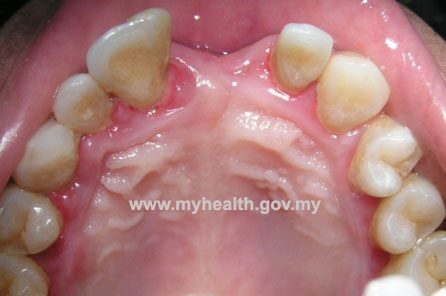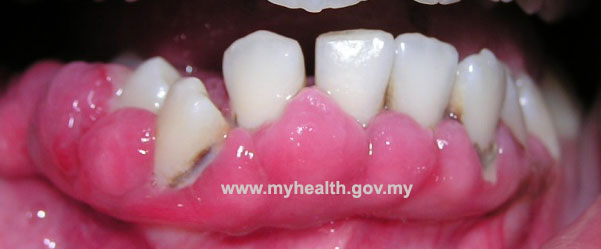Healthy tooth is anchored firmly in the jaw bone by the periodontium, a structure that is formed by gums, alveolar bone, tooth cementum and periodontal ligament.
Periodontal Disease
Periodontal disease or gum disease seen in most people is as a result of long-term or chronic bacterial infection. It is characterized with the destruction of gums and bone supporting the tooth. During the early stages, gums can be mildly swollen and bleeding on brushing without any pain. Thus, many do not even know they have periodontal disease. In late stages, a lot of alveolar bone is lost. Teeth can become mobile (loose teeth) with spaces between them. The gums surrounding the teeth will shrink and teeth may appear longer, showing the root surfaces. These teeth can just fall-out of the mouth while chewing.
|
|
||
|
Upper front teeth has dropped out |
|
Red, swollen gums in lower jaw with spacing of teeth |
Cardiovascular Diseases
Cardiovascular diseases particularly hypertension and ischaemic heart disease are the most common causes of adult death. These are disorders of the heart and blood vessels. The most common reason is a build-up of fatty deposits on the inner walls of the blood vessels. This buildup narrows the arteries, making it harder for blood to flow through. If a blood clot forms, it can block the blood flow causing a heart attack or stroke.
Link Between Periodontal Disease and Cardiovascular Disease
The health of the body in general is closely related to a healthy mouth. Several studies have suggested a possible link between periodontal disease and cardiovascular disease. However, there is not enough evidence exists to determine the cause and effect relationship between these two diseases.
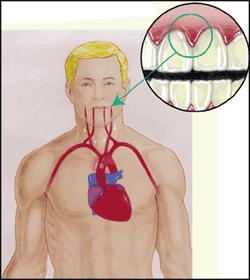
Image from: http://www.perio.org/consumer/heart_disease
Research based evidence
According to a research, patients with periodontal disease patients have a 25% increased risk of cardiovascular disease relative to those without it. Another research showed that periodontal disease was reported to be associated with small increased risk for heart disease among men younger than 50 years.
Some researchers have explained that bacteriaand itsby-products from diseased gums can enter via blood stream to other parts of the body. This can directly damage blood vessels and vital organs and also increases incidence of clot formation leading to heart attacks.
However, some researchers say, the higher risk for heart attack is due to other reasons. In particular, patients with periodontal disease share similar risk factors of patients with cardiovascular disease including age, gender, lower socioeconomic status, smoking and high stress level.
Warning signs for periodontal (gum) disease:
- Bleeding gums during brushing
- Red, swollen or tender gums
- Gums that have pulled away from the teeth
- Persistent bad breath
- Pus between the teeth and gums
- Loose or spacing between teeth
- A change in the way your teeth fit together when you bit
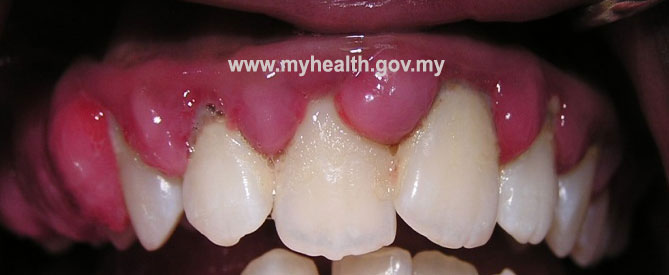 |
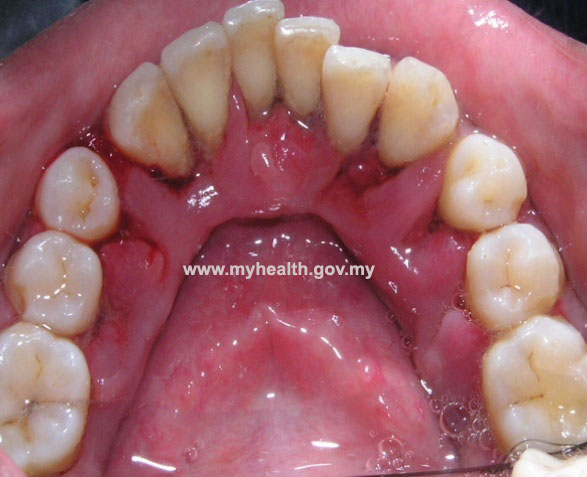 |
|
|
Red, swollen gums in upper jaw |
Swollen, bleeding gums with gingival recession and spacing of teeth on the lower jaw |
To maintain the best oral health, you should:
- Establish daily tooth brushing and flossing.
- Be aware of the signs of periodontal diseases.
- Have regular dental check up every 6 to 12 months.
- Make sure you inform your dentist that you have a heart problem and medications that you are taking for it.
- Carefully follow your physician’s and dentist’s instructions and use prescription medications, such as antibiotics, if necessary as directed.
Periodontal Treatment
Periodontal disease causes gum inflammation and existing evidence shows that chronic inflammation in any part of body can damage the heart and blood vessels. A high c-reactive protein level in the blood is an indication of on-going inflammation and is detrimental for health. C-reactive protein levels are high in patients with periodontal disease and in patients with cardiovascular disease. Thus, treating periodontal disease should improve the health of those with cardiovascular disease.
References
- Beck JD, Offenbacher S, Williams RC, Gibbs P, Garcia K. Periodontitis: a risk factor for coronary heart disease? Ann Periodontol 1998: 3: 127-141.
- DeStefano F, Anda RF, Kahn HS, Williamson DF, Russell CM. Dental disease and risk of coronary heart disease and mortality. BMJ 1993: 306: 688-691.
- Periodontal Disease and Coronary Heart Disease / Atherosclerosis, Caranza’s Clinical Periodontology 11th Edition By Michael G. Newman DDS, Henry Takei DDS, MS, Perry R. Klokkevold, DDS,MS and Fermin A. Carranza, Dr. ODONT.
- Periodontal Disease and Atherosclerotic Vascular Disease: Does the Evidence Support an Independent Association? : A Scientific Statement From the American Heart Association. Peter B. Lockhart, Ann F. Bolger, Panos N. Papapanou et al; Circulation published online April 18, 2012.
- Image from: http://www.perio.org/consumer/heart_disease
- Clinical Photos: Courtesy of Dr. Khamiza Binti Zainol Abidin.
| Last Reviewed | : | 18 July 2014 |
| Writer | : | Dr. Zaharah bt. Abd. Rahman |
| Accreditor | : | Datin Dr. Indra a/p Nachiappan |


